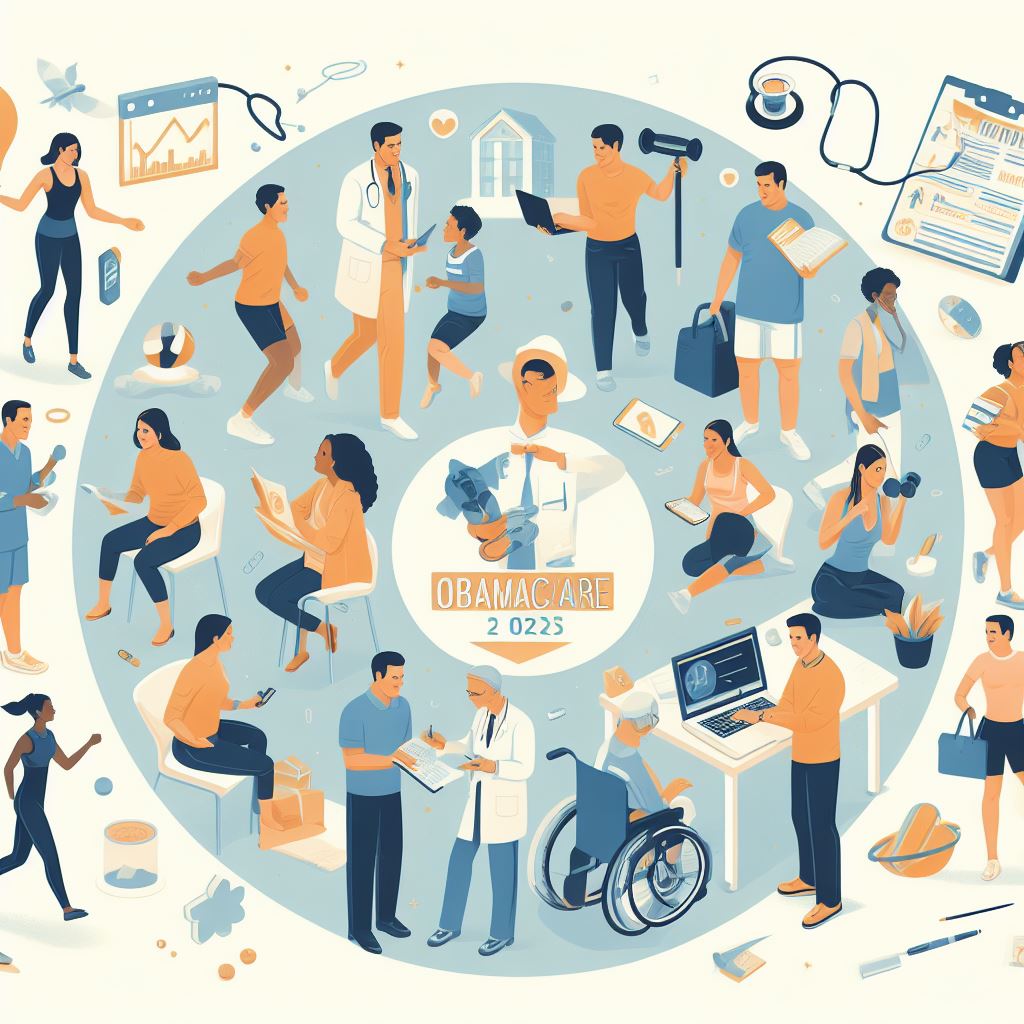11 Key Tips to Qualify for Obamacare 2023

Imagine qualifying for Obamacare 2023 effortlessly. Discover the essential tips that will guide you through the process.
- Gather the required documents, understand income eligibility, and check state-specific requirements.
- Research available coverage options, compare plans and premiums, and determine eligibility for cost assistance.
- Consider Medicaid expansion and explore the Health Insurance Marketplace.
- Seek professional assistance if needed.
With these 11 key tips, you’ll navigate the system with confidence and secure the healthcare coverage you deserve.
Key Takeaways
- Gather all required documents, including proof of identity, citizenship or legal residency, and income.
- Understand the income eligibility criteria based on the Federal Poverty Level (FPL) and the Modified Adjusted Gross Income (MAGI) calculation.
- Check state-specific eligibility criteria and requirements, including income limits, residency requirements, and proof of income.
- Enroll during the Open Enrollment Period to secure coverage under Obamacare 2023 and explore special enrollment periods triggered by life events.
Gather Required Documents
Before applying for Obamacare in 2023, gather the necessary documents to prove your eligibility. It’s crucial to have all the required paperwork in order to streamline the application process and ensure a smooth transition into the program.
The documents you’ll need to gather include proof of identity, proof of citizenship or legal residency, proof of income, and any relevant tax forms. These documents are essential in determining your eligibility for Obamacare and the level of financial assistance you may qualify for.
Firstly, you’ll need to provide proof of your identity, such as a valid driver’s license or passport. This is necessary to verify your identity and ensure that you’re who you claim to be. Additionally, you’ll need to provide proof of your citizenship or legal residency, which can be in the form of a birth certificate, naturalization certificate, or immigration documents.
Secondly, you’ll need to provide proof of your income. This can be done by providing copies of your recent pay stubs, tax returns, or a letter from your employer. This information is crucial in determining your eligibility for financial assistance, as it helps to determine your household income.
Lastly, gather any relevant tax forms, such as your W-2 forms or 1099 forms. These forms provide important information about your income and are necessary for accurately assessing your eligibility for Obamacare.
Understand Income Eligibility
To determine if you’re eligible for Obamacare in 2023, understand the income requirements. It’s important to know the income thresholds set by the Affordable Care Act (ACA) to ensure you qualify for the benefits.
Here are three key points to consider:
- Income Limits: The ACA establishes income limits based on the Federal Poverty Level (FPL). These limits vary depending on household size. It’s crucial to know where your income falls in relation to the FPL to determine your eligibility for insurance subsidies.
- Modified Adjusted Gross Income (MAGI): When assessing your income eligibility, the ACA considers your modified adjusted gross income, which includes various types of income such as wages, self-employment income, and certain deductions. Understanding how MAGI is calculated can help you accurately assess your eligibility.
- Medicaid Expansion: It’s essential to be aware of your state’s Medicaid expansion status. The ACA intended to expand Medicaid coverage for individuals and families with income below a certain percentage of the FPL. However, not all states have implemented this expansion, leading to variations in eligibility criteria.
Check State-Specific Requirements
To ensure your eligibility for Obamacare in 2023, it’s crucial to check your state-specific requirements.
Each state has its own eligibility criteria, which may vary from the federal guidelines. These criteria often include income threshold variations and specific documentation needed for verification.
It’s important to thoroughly review your state’s requirements to ensure you meet all necessary criteria and provide the correct documentation to qualify for Obamacare.
State Eligibility Criteria
To determine if you qualify for Obamacare 2023, it’s essential to familiarize yourself with the state-specific requirements for eligibility. Each state has its own set of criteria that individuals must meet in order to be eligible for healthcare coverage under the Affordable Care Act.
Here are some important factors to consider:
- Income: Many states have income limits for eligibility. Your income will be compared to the federal poverty level (FPL) to determine if you qualify for subsidies or Medicaid.
- Residency: Some states require individuals to be residents in order to be eligible for Obamacare. You may need to provide proof of residency, such as a driver’s license or utility bill.
- Citizenship/Immigration Status: Eligibility for Obamacare may be restricted to U.S. citizens or lawful immigrants. You may need to provide documentation to prove your status.
Understanding the state-specific requirements is crucial to determine if you qualify for Obamacare 2023. Make sure to research and verify the eligibility criteria in your state to ensure you meet all the necessary requirements.
Income Threshold Variations
You should check the state-specific requirements for income threshold variations in order to determine if you qualify for Obamacare 2023.
Each state has its own guidelines and criteria for determining eligibility based on income. It’s important to be aware of these variations because they can significantly impact your ability to qualify for the program.
Some states may have higher income thresholds, allowing more individuals and families to qualify for subsidies and other benefits under Obamacare. On the other hand, some states may have stricter requirements, making it more difficult to meet the income criteria.
Documentation Needed for Verification
When verifying your eligibility for Obamacare 2023, make sure to gather the necessary documentation as specified by your state’s requirements. The documentation needed for verification may vary from state to state, so it’s important to familiarize yourself with your state’s specific guidelines.
Here are three key documents that you may need to provide:
- Proof of identity: This could include a government-issued ID card, such as a driver’s license or passport, to verify your identity and ensure that you’re eligible for Obamacare.
- Proof of residency: You may need to provide documents, such as utility bills or a lease agreement, to demonstrate that you’re a resident of the state in which you’re applying for Obamacare.
- Proof of income: This can include pay stubs, tax returns, or bank statements to verify your income and determine your eligibility for subsidies or other financial assistance.
Research Available Coverage Options
To ensure that you qualify for Obamacare in 2023, it’s crucial to thoroughly research the available coverage options.
Start by understanding the coverage eligibility criteria, such as income requirements and citizenship status.
Next, compare the benefits offered by different plans to determine which one best suits your healthcare needs.
Coverage Eligibility Criteria
Take time to research the various coverage options available to determine your eligibility for Obamacare 2023. Understanding the coverage eligibility criteria is crucial in ensuring that you can access the healthcare benefits you need.
Here are three key factors to consider:
- Income: Check whether your income falls within the eligible range for Obamacare subsidies. This can significantly reduce your premium costs and make healthcare more affordable.
- Citizenship or Immigration Status: Confirm that you meet the citizenship or immigration status requirements. Obamacare is designed to provide coverage to U.S. citizens and certain lawfully present immigrants.
- Age: Consider the age requirements for Obamacare. While there’s no upper age limit, individuals who are 65 or older may be eligible for Medicare instead.
Comparing Plan Benefits
To compare plan benefits and research available coverage options under Obamacare 2023, you should carefully evaluate the different healthcare plans that meet your eligibility criteria.
Start by understanding your individual healthcare needs and priorities. Consider factors such as your current health condition, prescription medication requirements, and preferred healthcare providers.
Then, thoroughly review the plan benefits and coverage details of each option. Pay close attention to services covered, deductibles, copayments, and out-of-pocket maximums.
Analyze the network of doctors and hospitals associated with each plan to ensure your preferred providers are included.
Additionally, compare the different plan premiums and subsidies available to you. This will help you determine the most cost-effective option that meets your healthcare needs.
Compare Plans and Premiums
As you compare plans and premiums, consider your specific needs and budget to find the most suitable option for you under Obamacare 2023. It’s important to take the time to carefully evaluate your options and weigh the benefits and costs of each plan.
Here are some key points to keep in mind as you navigate through the process:
- Affordability: Look for a plan that fits within your budget and offers reasonable premiums. Consider how much you can comfortably afford to pay each month without straining your finances.
- Coverage: Assess your healthcare needs and make sure the plan you choose provides adequate coverage for the services and treatments you may require. Evaluate the plan’s network of healthcare providers to ensure your preferred doctors and specialists are included.
- Out-of-pocket costs: Take into account not only the monthly premiums but also the deductibles, copayments, and coinsurance. Carefully review the details of each plan’s cost-sharing structure to understand how much you may be responsible for paying out of pocket.
Enroll During the Open Enrollment Period
Enroll in a health insurance plan during the Open Enrollment Period to ensure coverage under Obamacare 2023. The Open Enrollment Period is a specific timeframe each year when individuals can sign up for health insurance or make changes to their existing coverage. It’s crucial to take advantage of this period to secure the health insurance you need.
During the Open Enrollment Period, you have the opportunity to compare different plans and premiums to find the one that best suits your needs and budget. This is a crucial step in ensuring that you have adequate coverage for the upcoming year. It allows you to consider factors such as deductibles, copayments, and the network of healthcare providers.
By enrolling during the Open Enrollment Period, you also avoid the risk of facing a penalty for being uninsured. Under the Affordable Care Act, individuals who don’t have health insurance may face a financial penalty. By enrolling during the designated period, you can avoid this penalty and ensure that you have the coverage you need.
Now that you understand the importance of enrolling during the Open Enrollment Period, it’s essential to explore special enrollment periods. These periods allow individuals to sign up for health insurance outside of the standard enrollment period due to qualifying life events, such as getting married, having a baby, or losing other health coverage. Understanding both the Open Enrollment Period and special enrollment periods will help you navigate the process and secure the coverage you need under Obamacare 2023.
Explore Special Enrollment Periods
During the Open Enrollment Period, you have the opportunity to explore special enrollment periods that allow you to sign up for health insurance outside of the standard enrollment period. These special enrollment periods provide you with additional options and flexibility when it comes to obtaining healthcare coverage.
Here are three reasons why exploring special enrollment periods can be beneficial for you:
- Life changes: Special enrollment periods are triggered by certain life events, such as getting married, having a baby, or losing other health coverage. These events can be emotionally overwhelming, but they also provide you with the chance to reassess your healthcare needs and make necessary adjustments.
- Unforeseen circumstances: Sometimes life throws unexpected challenges our way. Whether it’s a sudden job loss, a divorce, or a change in residency, special enrollment periods allow you to secure health insurance when you need it most. Knowing that you have this option can provide a sense of security and peace of mind during uncertain times.
- Avoiding penalties: By exploring special enrollment periods, you can ensure that you’re compliant with the Affordable Care Act and avoid potential penalties for being uninsured. Understanding the rules and regulations surrounding special enrollment periods can help you navigate the healthcare system effectively and avoid any unnecessary financial burdens.
Determine Eligibility for Cost Assistance
To determine your eligibility for cost assistance under Obamacare, you need to meet income-based criteria. This means that your income must fall within a certain range to qualify for financial assistance.
To verify your income, you’ll need to provide proof, such as pay stubs or tax documents, to the healthcare marketplace.
Income-Based Eligibility Criteria
If you want to determine your eligibility for cost assistance under Obamacare 2023, you must meet the income-based criteria. These criteria are designed to ensure that individuals and families with lower incomes receive the financial support they need to afford healthcare coverage.
Here are three important factors to consider when assessing your income eligibility:
- Income Level: Your annual income will be a key factor in determining your eligibility for cost assistance. Generally, individuals with lower incomes are more likely to qualify for financial assistance.
- Family Size: The size of your household will also affect your eligibility. Larger families may qualify for cost assistance if their income falls within the specified range.
- Federal Poverty Level: The income-based eligibility criteria are based on the Federal Poverty Level (FPL). The FPL is updated annually and takes into account factors such as household size and location.
Understanding these income-based criteria will help you determine whether you qualify for cost assistance under Obamacare 2023.
Proof of Income Required
When determining your eligibility for cost assistance under Obamacare 2023, it’s important to provide proof of income. This is necessary to determine your eligibility for financial support. Proof of income helps the government assess your income level and determine the amount of financial assistance you may qualify for.
This documentation can include pay stubs, tax returns, or bank statements that clearly show your income. It’s crucial to ensure that the provided proof is accurate and up-to-date. Inaccurate or outdated information can lead to incorrect calculations and potentially affect your eligibility for cost assistance.
Remember to gather all relevant documents and keep them organized to make the application process smoother. Providing proof of income is a vital step in determining your eligibility and ensuring that you receive the financial support you need under Obamacare 2023.
Understand Medicaid Expansion
To understand Medicaid expansion, you must be aware of the eligibility requirements and benefits it offers. Medicaid expansion is a provision of the Affordable Care Act (ACA) that aims to provide health insurance coverage to low-income individuals and families who don’t qualify for traditional Medicaid. Here are three key points to consider:
- Improved access to healthcare: Medicaid expansion allows individuals with incomes up to 138% of the federal poverty level to qualify for Medicaid coverage. This expansion ensures that more people have access to essential healthcare services, including preventive care, doctor visits, hospital stays, and prescription drugs. Knowing that you have access to quality healthcare can bring peace of mind and alleviate the stress of worrying about medical expenses.
- Financial relief: Medicaid expansion can provide significant financial relief for individuals and families who’d otherwise struggle to afford health insurance. With Medicaid coverage, you may be able to receive medical services without incurring high out-of-pocket costs, making it easier to manage your budget and prioritize other essential expenses.
- Health security: Having health insurance through Medicaid expansion can offer a sense of security and protection for you and your loved ones. Knowing that you have coverage can give you peace of mind, allowing you to focus on your health and well-being without the constant worry of being uninsured.
Understanding the benefits of Medicaid expansion is crucial when considering your healthcare options. Now, let’s explore the next important aspect of qualifying for Obamacare: considering the health insurance marketplace.
Consider the Health Insurance Marketplace
When considering qualifying for Obamacare 2023, it’s important to explore the health insurance marketplace. The health insurance marketplace, also known as the exchange, is a platform where individuals and families can compare and purchase health insurance plans. It’s designed to provide a centralized location for consumers to find coverage that fits their needs and budget.
One of the key benefits of the health insurance marketplace is the availability of subsidies. These subsidies are intended to make health insurance more affordable for individuals and families with lower incomes. Depending on your income and household size, you may be eligible for premium tax credits, cost-sharing reductions, or both. These subsidies can significantly reduce the cost of your health insurance premiums and out-of-pocket expenses.
In addition to subsidies, the health insurance marketplace offers a wide range of health insurance plans to choose from. These plans vary in terms of coverage, cost, and provider networks. It’s important to carefully evaluate your options and consider factors such as your healthcare needs, budget, and preferred providers.
When exploring the health insurance marketplace, it’s also important to consider the enrollment period. The open enrollment period is the designated time each year when individuals can enroll in or make changes to their health insurance plans. Outside of the open enrollment period, you may only be able to enroll in a plan if you qualify for a special enrollment period due to a qualifying life event, such as getting married or having a baby.
Seek Professional Assistance if Needed
If you need help with qualifying for Obamacare 2023, consider reaching out to a professional for assistance. Navigating the complexities of healthcare can be overwhelming, and having a knowledgeable expert by your side can make the process much smoother.
Here are three compelling reasons why seeking professional assistance is a wise choice:
- Expertise: Professionals specializing in healthcare can provide you with valuable insights and guidance. They’ve a deep understanding of the eligibility criteria, application process, and available options, enabling them to offer tailored advice based on your unique circumstances. By leveraging their expertise, you can ensure that you’re taking full advantage of all the benefits and subsidies that Obamacare 2023 has to offer.
- Peace of Mind: Dealing with healthcare can be stressful, especially when it comes to understanding complex regulations and paperwork. By working with a professional, you can alleviate this burden and gain peace of mind. They’ll handle the administrative tasks, ensuring that all the necessary forms are filled out accurately and submitted on time.
- Maximized Benefits: Professionals can help you maximize your benefits by identifying potential deductions, exemptions, and credits that you may be eligible for. They can analyze your financial situation, assess your healthcare needs, and recommend the most cost-effective options. This personalized approach can save you both time and money in the long run.
Frequently Asked Questions
What Are the Income Eligibility Requirements for Obamacare in 2023?
To qualify for Obamacare in 2023, you need to meet the income eligibility requirements. These requirements determine if you are eligible for premium tax credits or cost-sharing reductions based on your household income and size.
Do I Need to Provide Any Specific Documents to Qualify for Obamacare in 2023?
You’ll need to provide specific documents, like proof of income and citizenship, to qualify for Obamacare in 2023. Don’t worry, it’s not as daunting as it seems. Just make sure you have everything ready!
Are There Any Specific Requirements or Regulations for Obamacare in My State?
In your state, there may be specific requirements or regulations for Obamacare in 2023. It’s important to research and understand what those may be to ensure you qualify and receive the benefits you need.
What Coverage Options Are Available Under Obamacare in 2023?
Looking for coverage options under Obamacare in 2023? Discover the range of plans available to you, from essential health benefits to preventive services. Find the right fit for your needs and ensure you’re covered.
How Do the Plans and Premiums Under Obamacare in 2023 Compare to Each Other?
When comparing plans and premiums under Obamacare in 2023, it’s important to carefully analyze the coverage options available. Consider factors such as deductibles, copayments, and network providers to make an informed decision that suits your healthcare needs.



